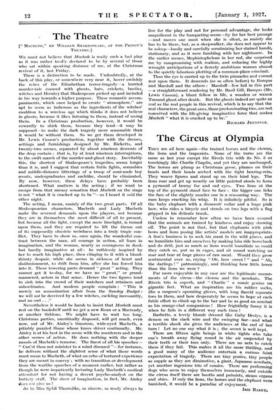The Theatre
(" MACBETH," BY WILLIAM SHAKESPEARE, AT THE PRINCE'S THEATRE.]
WE must not believe that Macbeth is really such a bad play as it was rather loudly declared to be by several of those who sat within speaking distance of me, at the Christmas revival of it, last Friday.
There is a distinction to be made. Undoubtedly, at the back of this play, or somewhere very near it, hover owlishly the relics of the Elizabethan terror-tragedy—a hurried murder-tale (sauced with ghosts, bats, crickets, beetles, witches and Hecate) that Shakespeare picked up and included in his way towards a higher purpose. These romantic accom- paniments, which once helped to create " atmosphere," are apt to seem as ludicrous as the ingredients of the witches' cauldron to a wireless age which thinks it does not believe in ghosts, because it likes listening to them, instead of seeing them. In a Christmas production, however, it would be cowardly to shirk them, because they tend—it may be supposed—to make the dark tragedy more seasonable than it would be without them. So we get them developed in Mr. Lewis Casson's production, together with the dresses, settings and furnishings designed by Mr. Ricketts, and twenty-two scenes, separated by about nineteen descents of the drop curtain : that is, by at least nineteen interruptions, to the swift march of the murder-and-ghost story. Inevitably this, the shortest of Shakespeare's tragedies, seems longer than it is, and I suggest that certain futile fights, scrambles and middle-distance titterings of a troop of semi-nude boy scouts, undergraduates and suchlike, should be eliminated, By now, however, these delays have probably been shortened. What matters is the acting ; if we want to escape from that uneasy sensation that Macbeth on the stage is not " what it is cracked up to be "—as I heard it said the other night.
The acting, I mean, mainly of the two great parts. Of all Shakespearian characters, Macbeth and Lady Macbeth make the severest demands upon the players, not because they are in themselves the most difficult of all to present, but because all the light, except the mere limelight, is turned upon them, and they are required to lift the theme out of its supposedly obsolete weirdness into a truly tragic con- flict. They have to show us, once again, the wonderful con- trast between the man, all courage in action, all fears in imagination, and the woman, nearly as courageous in deed, but hardly imaginative at all : he ruthlessly inspired by her to reach his high place, then clinging to it with a blood- thirsty despair, while she seems in sickness of heart and disillusionment, to drift from him, after she has forced him into it. These towering parts demand " great " acting. They cannot get it to-day, for we have no " great," or grand- mannered, actors in that sense. Hence the two figures tend to sink into the crowd of their watchers and retainers and subordinates. And modern people complain : " This is merely an assassination affair from the Sunday Budget : we will not be deceived by a few witches, cackling incessantly, and an owl . . ."
Nevertheless it would be harsh to insist that Macbeth must rest on the bookshelf until we get a new Kean or a Macready, or another Siddons. We might have to wait too long. Christmas parties, uncritically disposed, will get much, even now, out of Mr. Ainley's timorous, wide-eyed Macbeth, a pitiably puzzled thane whose knees shiver continually. Mr. Ainley is at his best in the scene with the murderers and in the other scenes of action. He does nothing with the deeper moods of Macbeth's remorse. The finest of all his speeches- " Can'st thou not minister to a mind diseased "—for instance, he delivers without the slightest sense of what those words must mean to Macbeth, of what an echo of tortured experience they are meant to convey ; with no transition or development from the warlike speeches of a moment earlier, but rather as though he were impatiently lecturing Lady Macbeth's medical attendant for not having a decent psycho-analyst on the buttery staff. The slave of imagination, in fact, Mr. Ainley does not give us !
As to Miss Sybil Thorndike, so sincere, so ready always to
live for the play and not for personal advantage, she looks magnificent in the banqueting-scene--by far her best passage —and moves one most when she is silent, as mainly she has to be there, but, as a sleepwalker, she does not appear to be asleep—busily and carefully scrutinizing her stained hands, stationary, and as it were fumbling with her nightmare. In the earlier scenes, Mephistophelean in her red, she surprised me by compromising with realism, and reducing the highly wrought anticipations of a fiercely ambitious woman almost to the quietly laborious plotting of .a common-place criminal.
Thus the eye is carried up to the twin pinnacles and cannot rest upon them. It descends (as so often before) to Banquo and Macduff and the others : Macduff—few fail in this part —a straightforward rendering by Mr. Basil Gill, Banquo (Mr. Lewis Casson), a blunt fellow in life, a wooden or waxen Tussaud ghost after death. But the ghosts indeed are quite as real as the real people in this revival, which is to say that the real characters, the great ones, those predominating two, are not conceived with the life-giving imaginative force that makes Macbeth " what it is cracked up to be."
RICHARD JENNINGS-


































 Previous page
Previous page